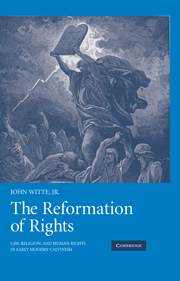Crossref Citations
This Book has been
cited by the following publications. This list is generated based on data provided by Crossref.
Witte Jr., John
2006.
Honor Thy Father and Thy Mother? Child Marriage and Parental Consent in Calvin’s Geneva.
The Journal of Religion,
Vol. 86,
Issue. 4,
p.
580.
2009.
Books Received.
Harvard Theological Review,
Vol. 102,
Issue. 1,
p.
125.
2010.
Christianity and Contemporary Politics.
p.
224.
ACHINSTEIN, SHARON
2010.
Saints or Citizens? Ideas of Marriage in Seventeenth-Century English Republicanism.
The Seventeenth Century,
Vol. 25,
Issue. 2,
p.
240.
Sandberg, Russell
2012.
Ecclesiastical Law Publications 1987–2011.
Ecclesiastical Law Journal,
Vol. 14,
Issue. 1,
p.
149.
Witte, John
2013.
Religious Sources and Dimensions of Human Rights.
SSRN Electronic Journal,
2014.
Natural Human Rights.
p.
30.
Weinberger, Lael Daniel
2014.
Global Perspectives on Subsidiarity.
Vol. 37,
Issue. ,
p.
49.
Patterson, Eric
and
Gill, Nathan
2015.
The Declaration of the United Colonies: America's First Just War Statement.
Journal of Military Ethics,
Vol. 14,
Issue. 1,
p.
7.
Little, David
2015.
Rethinking the Comparative Study of Religious Ethics.
Journal of Religious Ethics,
Vol. 43,
Issue. 3,
p.
525.
Witte, John
and
Christian Green, M.
2016.
The Wiley Blackwell Companion to World Christianity.
p.
330.
Chapman, Alison A.
2016.
Milton and Legal Reform.
Renaissance Quarterly,
Vol. 69,
Issue. 2,
p.
529.
Lloyd, Vincent
2016.
NEW DIRECTIONS IN NATURAL LAW.
Journal of Law and Religion,
Vol. 31,
Issue. 3,
p.
367.
Muller, Richard A.
2016.
Directions in the Study of Early Modern Reformed Thought.
Perichoresis,
Vol. 14,
Issue. 3,
p.
3.
Vorster, J.M.
2017.
Reformed theology today: Practical-theological, missiological and ethical perspectives.
van der Walt, Sarel P.
and
Vorster, Nico
2017.
Reformed theology today: Practical-theological, missiological and ethical perspectives.
Ballor, Jordan J.
2017.
Luther and Calvinism.
p.
123.
Osburn, Robert
and
Jeynes, William
2018.
The Wiley Handbook of Christianity and Education.
p.
577.
Hofheinz, Marco
2018.
Gewalt in der Bibel und in kirchlichen Traditionen.
p.
53.
Besteman, Bethany C.
2019.
Bondage of the Will: The Limitations of Political Theology in Measure for Measure.
Religions,
Vol. 10,
Issue. 1,
p.
28.



